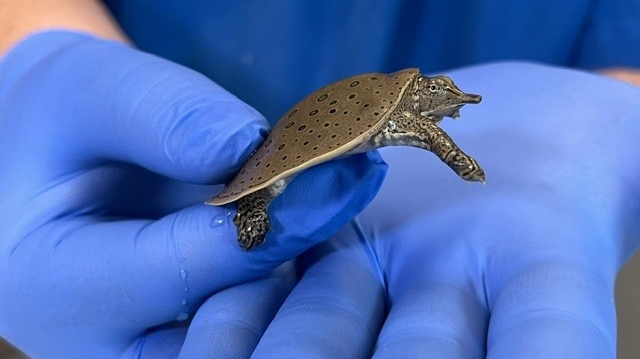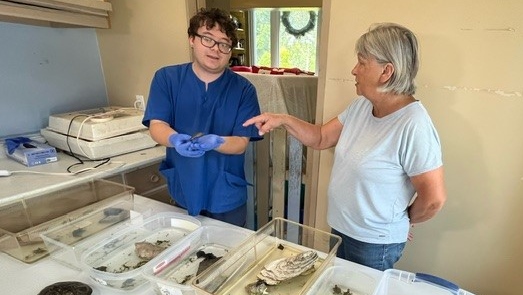Hundreds of rescued tiny turtle hatchlings being cared for in Essex County
Wings Rehab staff in Amherstburg are currently caring for 378 baby turtles as turtle nests across Essex County start hatching.
The hatchlings are the result of a new Turtle Salvage Program that Wings Rehab officials began this past spring in an effort to save eggs from female turtles that were hit on the road and died.
"It's very important to watch for them on the roads," warned wildlife technologist, Alexander Campbell. "Not only the adults, but now all the babies are out."
Campbell said the wildlife rehabilitation centre cared for more than 200 injured turtles during this past spring's nesting season, noting turtle nests typically hatch between mid-August to October.
 A rare Eastern Spiney Soft Shell turtle. (Chris Campbell/CTV News Windsor)
A rare Eastern Spiney Soft Shell turtle. (Chris Campbell/CTV News Windsor)
"Unfortunately, due to habitat fragmentation and road mortality, their population is in peril. Almost all the turtles in Ontario are now a species at-risk, but all are listed federally at-risk. So in reality, if we don't do something, we're going to lose our turtles," Campbell explained.
Campbell said eight different native species were being cared for in their facility, noting the group also collaborates with the Ontario Turtle Center in Peterborough for additional care.
"Females lay so many eggs but in reality, only one or two of those might actually reach to be within the breeding population,” Campbell continued.
“So it's really important for our turtles to get a head start over the winter at rehab facilities, so we can try and make a difference in their population."
On Friday, staff welcomed the public to see and learn more about the reptiles, while encouraging donations to help buy more incubators to care for more turtles.
 Woman learning about the turtles in Amherstburg, Ont. on Aug. 23, 2024. (Chris Campbell/CTV News Windsor)
Woman learning about the turtles in Amherstburg, Ont. on Aug. 23, 2024. (Chris Campbell/CTV News Windsor)
Campbell told CTV News the young turtles will overwinter at their facility until mid-May before they're released back into their ancestral wetlands.
If anyone should encounter a turtle hatchling on the road, Campbell said the best advice is to safely pick it up and gently bring it in the direction it was going.
"Simply move it in the direction it's headed. Don't relocate it to another wetland. Don't put it in your back pond. Don't take it home as a pet. Just simply help it across the road. Whether you lift it up or you stop traffic safely while doing so to ensure both you and the turtle are safe."
CTVNews.ca Top Stories

DEVELOPING Two-month GST holiday bill expected to pass the House today, Conservatives to vote against
The federal government's five-page piece of legislation to enact Prime Minister Justin Trudeau's promised two-month tax break on a range of consumer goods over the holidays, is expected to pass in the House of Commons by the end of the day.
Canada Post temporarily laying off striking workers, union says
The union representing Canada Post workers says the Crown corporation has been laying off striking employees as the labour action by more than 55,000 workers approaches the two-week mark.
Montreal shopping mall playing 'Baby Shark' song to prevent unhoused from loitering
A shopping mall and office complex in downtown Montreal is being criticized for using the popular children's song 'Baby Shark' to discourage unhoused people from loitering in its emergency exit stairwells.
B.C. man lied about cancer diagnosis while dodging $330K debt, court hears
A construction contractor from B.C.’s Lower Mainland has been ordered to repay a $330,000 loan from a friend who gave him leeway for years, despite her own financial suffering – all because she was under the false impression he had brain cancer.
Good Samaritan killed in tragic accident while helping stranded Calgary driver
Calgary police say a Good Samaritan who stopped to help another motorist was killed in an accident on Wednesday night.
Man jumps out of moving roller-coaster after safety belt fails
Terrifying video shows a man jumping out of a moving roller-coaster in Arizona after he says his safety belt failed.
The Vienna sausage stand is more than just a snack stall. Now it has a UNESCO heritage recognition
The Vienna sausage stand is a place where the street sweeper, the manager, the tourist and the celebrity converge for the same tasty snack. Now it also has the official stamp of approval as part of Austria’s heritage.
Competition Bureau suing Google, wants company to sell off two advertising services
The Competition Bureau is suing Google over alleged anticompetitive conduct in the tech giant's online advertising business and wants the company to sell off two of its services and pay a penalty.
Listeria contamination concerns prompt mushroom recall: Health Canada
Health Canada says customers across Ontario and Quebec should throw out or return any O’Ya hoho brand Enoki mushrooms due to listeria concerns.

































